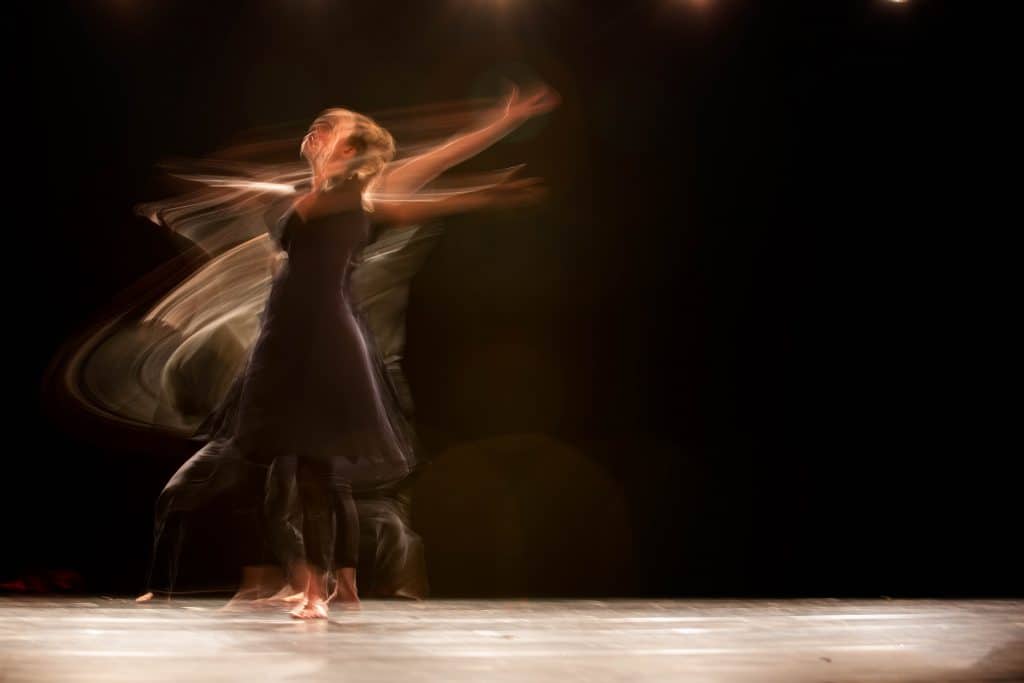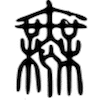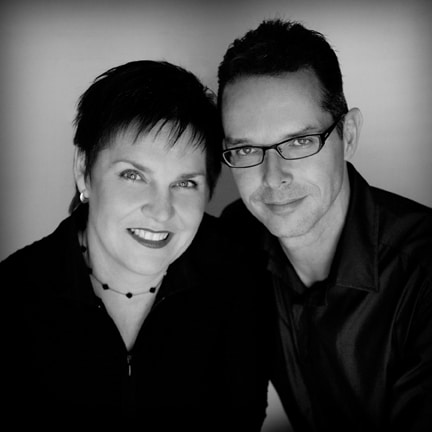

It is in the state of mind of MU that we find ourselves free to dance. The Japanese word MU means “void”, “emptiness”, “nothingness”.
The etymology of MU is of dancing figures (see image). The teachers of old knew that being in the state of mind of MU is like dancing with the universe, hence the origin of the word MU.
When we dance freely with the universe every movement is unique, each time we dance. If we hold onto the movement that we did yesterday, we get stuck and stop progressing. If we think about a movement that we need to make next, we focus on the future and become stuck with preconceived ideas. And if we are intellectualizing the movement in the present moment we also get stuck. To move freely in our practice we need to be in the state of MU; no past, present and future – completely open and free. In that instance we do not control or own the movement, we let it flow organically, and this comes from being One with the universe.
We can see this dance as dancing in the river of life, the universe. If we have two rivers and in each river we throw a leaf, than each leave will flow its own unique course. Not one leaf will copy exactly the other’s movements. The leaf is also not judging, “Oh look, I am going this way, or that way”. It just lets itself be moved freely without judgements. And a leaf never leaves any traces behind it.
Within our meditation and other spiritual practices we often leave traces. For example, when we become proud of our practice we have an attachment to the idea of what we have achieved or accomplished.
“Oh I was so compassionate to this old lady today”
“My meditation is going really well now”
“I helped this person to get over their headache”.
But to dance completely free with with universe we need to be like the leaf, leaving no trace.
The state of mind of MU needs to be experienced directly, not from an intellectual level, but from a direct inner knowing. This direct experience is also a state of non-duality as it is in this state that we stop labeling our spiritual practice as “good” or “bad”. We just dance, that is all, with no need to label. We Just Dance.
Without thinking at all, its expression came directly from its life-force. Isn’t this what we long to do in our lives? To find a way for our essence to be expressed?
Jakusho Kwong
When you dance, the hand holds the fan and the foot takes a step. When you do not forget everything, when you go on thinking about performing with the hands and the feet well and dancing accurately, you cannot be said to be skillful. When the mind stops in the hands and the feet, none of your acts will be singular. If you do not completely discard the mind, everything you do will be done poorly.
Takuan Soho
The mind that becomes fixed and stops in one place does not function freely. Similarly, the wheels of a cart go around because they are not rigidly in place. If they were to stick tight, they would not go around. The mind is also something that does not function if it becomes attached to a single situation.
Takuan Soho
Bronwen and Frans Stiene are the co-founders of the International House of Reiki and co-authors of The Reiki Sourcebook, The Japanese Art of Reiki, Your Reiki Treatment, The A-Z of Reiki Pocketbook and the Reiki Techniques Card Deck. Bronwen and Frans teach in the USA, Europe and Australia. Visit the Courses page to find a course near you.


Comments 14
Exquisite! The “headache” reference is close to home Frans and a timely reminder:-)
Thanks
Sundar
This is a beautiful metaphor for living, Frans, thanks for writing it! It is really about being fully present in this very moment, isn’t it. When we are truly present, everything else naturally and without effort falls away. It reminded me of this quote that I found a while ago:
We could say that meditation doesn’t have a reason or doesn’t have a purpose. In this respect it’s unlike almost all other things we do except perhaps making music and dancing. When we make music we don’t do it in order to reach a certain point, such as the end of the composition. If that were the purpose of music then obviously the fastest players would be the best. Also, when we are dancing we are not aiming to arrive at a particular place on the floor as in a journey. When we dance, the journey itself is the point, as when we play music the playing itself is the point. And exactly the same thing is true in meditation. Meditation is the discovery that the point of life is always arrived at in the immediate moment. –Alan Watts
Hi Kathleen,
Wonderful quote from Alan Watts.
As you say everything just takes place effortless. Dancing in the flow of the universe.
It so happens that I have been sitting with the ‘Mu’ koan. Traditionally, it is the first koan given to a zen student, and I would say that its purpose is to elicit an initial encounter with the space of emptiness.
The following is from Robert Aitken’s translation of the koan and commentary.
Case:
A monk asked Zhao Zhou, “Has a dog buddha nature or not?”
Zhao Zhou said, “Mu.”
Commentary:
For the practise of Zen, it is imperative that you pass through the barrier set up by the Ancestral Teachers. For subtle realization it is of the utmost importance that you cut off the mind road. If you do not pass the barrier of the ancestors, if you do not cut off the mind road, then you are a ghost clinging to bushes and grasses.
What is the barrier of the Ancestral Teachers? It is just this one word “Mu”—the one barrier of our faith …
Hi Jason,
Here is a part of the book: Two Zen Classics – Mumonkan & Hekiganroku by Katsuki Sekida:
“A monk asked Joshu, “Has a dog Buddha Nature?. Joshu answered, “Mu”
Mumon’s comment: In order to master Zen, you must pass the barrier of the patriarchs. To attain this subtle realization, you must completely cut off the way of thinking. If you do not pass the barrier, and do not cut off the thinking, then you will be like a ghost clinging to the bushes and weeds. Now, I want to ask you, what is the barrier of the patriarchs? Why, it is the single word “Mu.” That is the front gate to Zen. Therefore it is called the “Mumonkan of Zen.” If you pass through it, you will not only see Joshu face to face, but you will als go hand in hand with the successive patriarchs, entangling eyebrows with theirs, seeing with the same eyes, hearing with the same ears. Isn’t that a delightful prospect? Wouldn’t you like to pass this barrier?
Arouse your entire body with its three hundred and sixty bones and joints and its eighty-four thousand pores of the skin; summon up a spirit of great doubt and concentrate on this word “Mu.” Carry it continuously day and night. Do not form a nihilistic conception of vacancy, or relative conception of “has” or “has not.” It will be just as if you swallow a red-hot iron ball, which you cannot spit out even if you try. All the illusory ideas and delusive thoughts accumulated up to the present will be exterminated, and when the time comes, internal and external will be spontaneously united. You will know this, but for yourself only, like a dumb man who has a dream. Then all of a sudden an explosive conversion will occur and you will astonish heaven and shake the earth. “
“Mumon’s verse:
The dog, the Buddha Nature,
The pronouncement, perfect and final.
Before you say it has or has not,
You are a dead man on the spot.”
So for me we could also say: Has a human being Buddha Nature? Answer would be “Mu.”
Everything has Buddha Nature however a human being might not realize that he/she has it. A dog has Buddha Nature, however she might not realize that she has it. But this can change through practice or a sudden experience, and this can be equal to humans or animals. An animal might suddenly hear a sacred text being recited and achieves enlightenment. As Mumon states do not form a relative concept of has and has not. But that is how we normally work isn’t it, we look only at the relative level, but to pass through the barrier we need to enter the ultimate level.
Interesting stuff.
Being totally present to the moment, being totally in the dance, is vital for every aspect of our lives. What came to my mind reading this was not some beautiful, profound thought, but the memory of a friend of mine named Alba. Alba was a criminal court interpreter. She translated the charges, testimony, evidence into Spanish and back into English in criminal cases. Some of these cases were horrific; murder, rape, sometimes involving children. She is a simultaneous interpreter, which means as the person is speaking, she is translating at the same time, not afterwards. I asked her once how she could do it, all that pain and horror. She said that she learned to translate without attachment to the words, and that once the words were out of her mouth, they were gone. She did not remember them. She was in the moment and when the moment was gone, so was that experience. This came after almost collapsing under the weight of knowing of other’s past pain and what their futures might have been. Be fully present in the now is crucial for our lives.
I’ve danced all my life and I love this! I will explore the kanji, and just off the top of my head, suspect the Chinese equivalent is “WU”. I’m curious now, if the symbols are related if not identical. Researching…
Hi Kris,
We can practice everywhere, even in the courts. I remember a story of a man who came to Buddha and the man said he had difficulty practicing, so Buddha ask him what kind of job he did, he was pounding seeds, so Buddha said, just pound it mindfully and in the end this man became a mahasiddha.
We need to dance with live, and when we do that live becomes so much easier, and therefore spiritual practice will not be separated from live.
Hi Ched,
Yes Mu comes from Wu.
Keep on dancing.
When one is physically dancing, it is best to be in the present otherwise you tend to overdance the music. Anticipating the next step and before you know it you are rushing through the piece. Be here now.
Hi Kathi,
So true, if we are not pressent we anticipate the next move and this of course takes us out of the present moment.
Keep on dancing!!!
That’s beautifully written Frans, goes with the podcast I was listening last few days by H.E. Davey. Being Mu or empty seems not only object subject relation or you/me are dissolved but also but also gives freedom on how to respond to it…freely or shall I say by dancing. Its not all easy to do it though , meaning in state of emptiness , you do worry what others think , what you think, ego etc. But wouldn’t that be nice to be Mu and have the power to take it what ever comes your way…
My favorite quote as a dancer was by Merce Cunningham: “You have to love dancing to stick to it. It gives you nothing back, no manuscripts to store away, no paintings to show on walls and maybe hang in museums, no poems to be printed and sold, nothing but that single fleeting moment when you feel alive.” Reiki also centers me in that space of just being in the moment that dancing does. Beautiful expression of what it means to dance with the universe. Thank you Frans. With love and gratitude.
Thanks Jean!